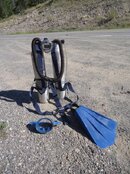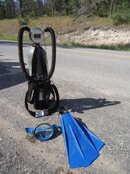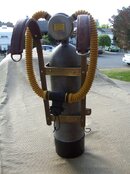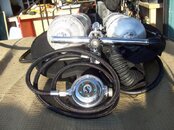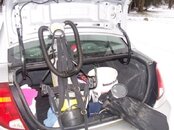I was hoping that nobody would get any articles of clothing wrinkled  as a result of this thread, please.
as a result of this thread, please.
I think there is some good training today and some really horrid training. I think divers today are much more equipment dependent and I do not think that can be argued against.
I am pretty sure that I could buddy breath with a diver if I needed to, especially if I was the one donating air and I occasionally practice it. It really is not some superhuman feat of underwater godliness. The only OOA situation, me being the one OOA, was circa 1982, my wife and I out of Fort Lauderdale. About 80 feet. It is a long story but I was stone cold out of air. And being drug by the current, I had the buoy, away from my wife and the group. I released, and began an ascent when my wife saw me and hurried my way, I met her already rising and we buddy breathed until about 60 feet and then I released her and made a gentle free ascent. No, we did not have octopus rigs. it was not a big deal to anybody but the captain who raised a fuss because I went OOA. See, the problem with being relatively fit, I can also use a whole lot of air without realizing it and I did trying to pull that buoy to keep up with an errant diver in our group.
I am not sure anything with DIR has anything to do with solo. I think they are mutually exclusive. That is not a put down on the DIR system, just my take on it, one is a team diving strategy, the other is clearly not.
An octopus/second and it's fittings do, in my opinion, right or wrong, represent a decrease in reliability. It is a needed and acceptable small increase for the buddy diver because your buddy represents your redundancy and you his. But as a solo diver, there is no buddy and a free flow can empty a lot of air quickly. Nonetheless, this is something a solo diver should be able to handle or he/she should probably not be solo so I do not see it as a huge deal. For me, as a minimalist, I prefer to eliminate and streamline wherever possible and equipment that serves no purpose, no matter how small the additional risk or failure possibility, does not need to be there.
I think I got my questions answered for the time being, please feel free to continue, but boys, no hose cutting .
.
N
I think there is some good training today and some really horrid training. I think divers today are much more equipment dependent and I do not think that can be argued against.
I am pretty sure that I could buddy breath with a diver if I needed to, especially if I was the one donating air and I occasionally practice it. It really is not some superhuman feat of underwater godliness. The only OOA situation, me being the one OOA, was circa 1982, my wife and I out of Fort Lauderdale. About 80 feet. It is a long story but I was stone cold out of air. And being drug by the current, I had the buoy, away from my wife and the group. I released, and began an ascent when my wife saw me and hurried my way, I met her already rising and we buddy breathed until about 60 feet and then I released her and made a gentle free ascent. No, we did not have octopus rigs. it was not a big deal to anybody but the captain who raised a fuss because I went OOA. See, the problem with being relatively fit, I can also use a whole lot of air without realizing it and I did trying to pull that buoy to keep up with an errant diver in our group.
I am not sure anything with DIR has anything to do with solo. I think they are mutually exclusive. That is not a put down on the DIR system, just my take on it, one is a team diving strategy, the other is clearly not.
An octopus/second and it's fittings do, in my opinion, right or wrong, represent a decrease in reliability. It is a needed and acceptable small increase for the buddy diver because your buddy represents your redundancy and you his. But as a solo diver, there is no buddy and a free flow can empty a lot of air quickly. Nonetheless, this is something a solo diver should be able to handle or he/she should probably not be solo so I do not see it as a huge deal. For me, as a minimalist, I prefer to eliminate and streamline wherever possible and equipment that serves no purpose, no matter how small the additional risk or failure possibility, does not need to be there.
I think I got my questions answered for the time being, please feel free to continue, but boys, no hose cutting
N



